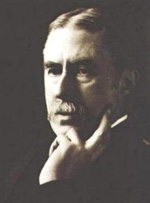Philology
Housman on Thought (#1)A E Housman's classic essay, The Application of Thought to Textual Criticism, appeared in the Proceedings of the Classical Association, v18 (1921), 67-84, here greatly abridged (for a complete text, click here). It puts in pungent form some principles for the correction and restoration of texts from later copies. Those principles will also apply to philology at large, and we are using Housman as an introduction to that larger subject. The key points are that philological knowledge and experience can lead to sound conclusions, but that the process of reaching those conclusions cannot be reduced to rules mechanically applied. Judgement ("thought") is always necessary.

Prolegomena
In beginning to speak about the application of thought to textual criticism, I do not intend to define the term thought, because I hope that the sense which I attach to the word will emerge from what I say. But it is necessary at the outset to define textual criticism, because many people, and even some people who profess to teach it to others, do not know what it is.
Textual criticism is a science, and since it comprises recension and emendation, it is also an art. It is the science of discovering error in texts and the art of removing it. That is its definition, that is what the name denotes. But I must also say something about what it does and does not connote, what attributes it does and does not imply, because here also there are false impressions abroad.
First, then, it is not a sacred mystery. It is purely a matter of reason and common sense. We exercise textual criticism whenever we notice and correct a misprint. Secondly, textual criticism is not a branch of mathematics, nor indeed an exact science at all. It deals with a matter not rigid and constant, like lines and numbers, but fluid and variable, namely the frailties and aberrations of the human mind, and of its insubordinate servants, the human fingers. It therefore is not susceptible of hard and fast rules. It would be much easier if it were, and that is why people try to pretend that it is. Of course you can have hard and fast rules if you like, but then you will have false rules, and they will lead you wrong, because their simplicity will render them inapplicable to problems which are not simple, but complicated by the play of personality.
Textual criticism therefore is neither mystery nor mathematics; it cannot be learnt either like the catechism or like the multiplication table. This science and this art require more in the learner than a simply receptive mind, and indeed the truth is that they cannot be taught at all. But the application of thought to textual criticism is an action which ought to be within the power of anyone who can apply thought to anything. It is not, like the talent for textual criticism, a gift of nature, but it is a habit, and like other habits, it can be formed. And when formed, though it cannot fill the place of an absent talent, it can modify and minimise the effects of the talent's absence. Because a man is not a born critic, he need not therefore act like a born fool, but when he engages in textual criticism he often does.
There is no science in which it is more necessary to take precautions against error arising from internal causes. Those who follow the physical sciences enjoy the great advantage that they can constantly bring their opinions to the test of fact, and verify or falsify their theories by experiment. Our conclusions regarding the truth or falsehood of a manuscript reading can never be confirmed or corrected by an equally decisive test, for the only equally decisive test would be the production of the author's autograph. It is therefore a matter of common prudence and common decency that we should neglect no safeguard lying within our reach; that we should look sharp after ourselves; that we should narrowly scrutinise our own proceedings and rigorously analyse our springs of action. How far those elementary requirements are satisfied, we will now learn from examples.
24 Dec 2005 / Contact The Project / Exit to Philology Page